Even though it’s quite obvious that the advice to restrict fat has made everyone fat, the low-carb vs low-fat debate continues.
Why?
Because the majority of the population still thinks the saturated fat in eggs, red meat, and butter causes heart disease.
Why?
Because that’s what the fraudulent Seven-Country Study told us 50 years ago, and that’s what the corporately funded research from cereal giants and corrupt doctors and scientists continue to support today.
Meanwhile, numerous systematic reviews over the last 10 years (1, 2, 3), have shown that saturated fat has no association with heart disease. And the only time there’s ever been a positive relationship between the two, is when saturated fat is added to a high-carbohydrate diet – something I doubt any nutrition or medical professional would disagree with.
HIGH FAT + HIGH CARB = HUGE MESS

Although, when it comes to lowering one or the other (carb or fat), there’s a notable difference in opinion. And not just from your buddy, or the guy down the street, but doctors, dieticians, nutritionists, fitness professionals…the list goes on.
So, who do you listen to?
Well, when you stop and look at the facts, the low-fat or low-carb decision is a lot easier than you think. Not just for determining what made us fat in the first place, but what’s going to help the majority of the population stop being fat.
The Rise in Obesity & Disease
I’ll try not to bore you with details, but over the last 40 years obesity has steadily increased:
- 1976 – 1980 – 15% obese
- 1988 – 1994 – 23.3% obese
- 1999 – 2000 – 30.9% obese
When you include the overweight population (BMI > 25), this 2000 total rises to 65.7% of the American population. And sadly, this figure continues to grow at an alarming rate:
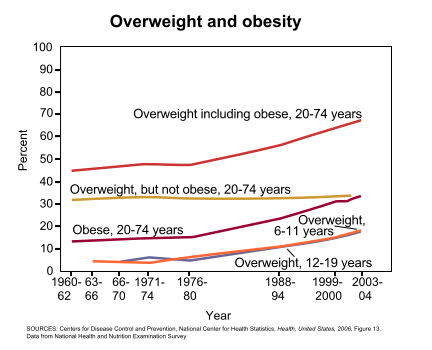
We’ve also seen a steady rise in diabetes. With the CDC calculating a figure of 29.1 million U.S. adults (1 in 10) fighting the disease – not including the 1 in 3 on the verge of diagnosis (pre-diabetic). Combined with consistent increases in cancers of all types, and a long list of degenerative diseases of the heart and brain.
For arguments sake, lets say that this is the result of a high-carb and high-fat diet. Even though it’s pretty clear what has increased:
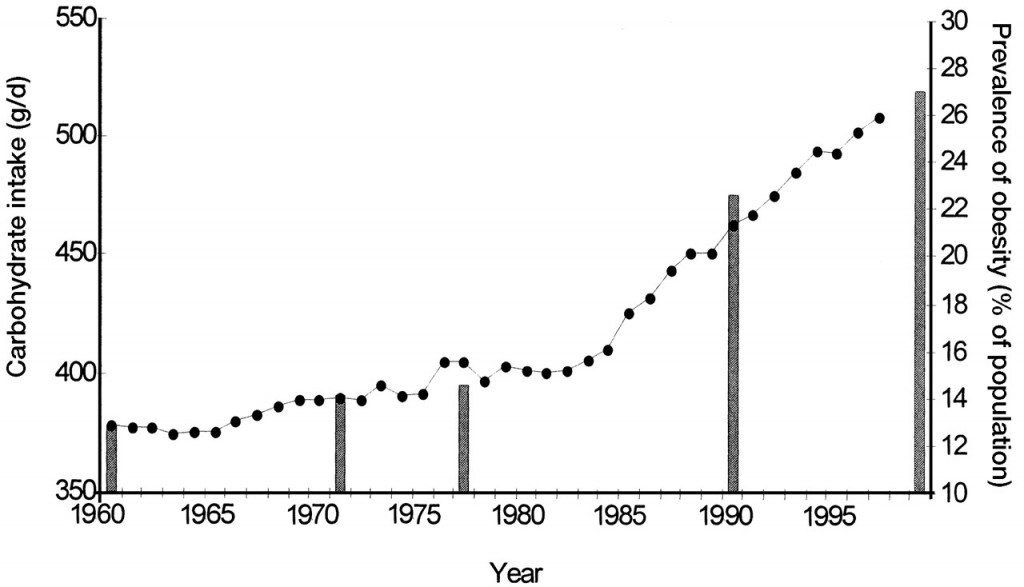
And what has decreased:
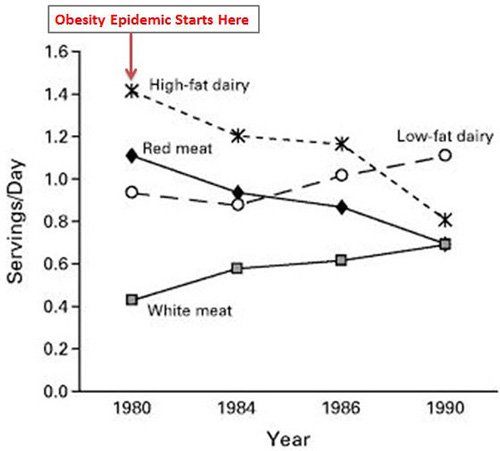
Or what those increases are composed of:
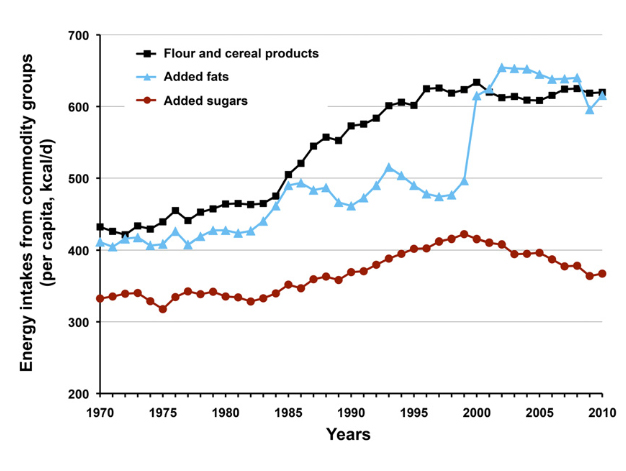
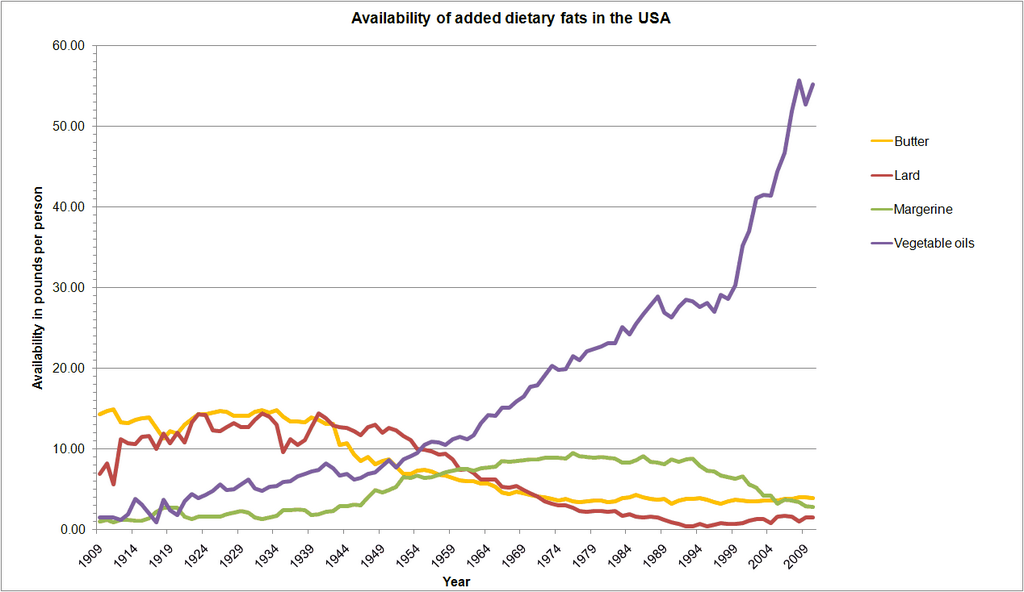
And which oil specifically is driving the ‘fats’ category:
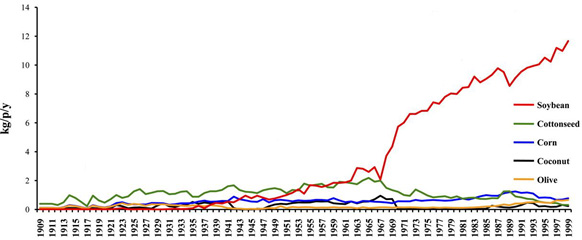
But to keep the critics happy, we’ll ignore all these things that point to an obvious driver of obesity, and we’ll pretend we’re all fat because of a diet high in carbohydrates and saturated fat.
Because either way, it shouldn’t change the advice on the best way to lose it. Right?
Interestingly, many of the same naysayers that refuse to blame the restriction of fat and increase in carbohydrates for obesity, would look at these charts and say we’re fat because we eat too much.
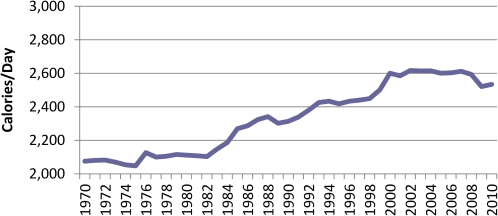
Which appears to be true….but what’s making us overeat?
How did we manage to eat the same amount of everything else yet increase our total carbohydrate consumption by 20%?
Surely not an increase in physical activity!
The only thing that’s changed is a reduction in foods high in saturated fats, and an increase in grains and polyunsaturated oils.
Plus, a notable rise in sweeteners and high-fructose corn syrup (also carbohydrates, by the way):
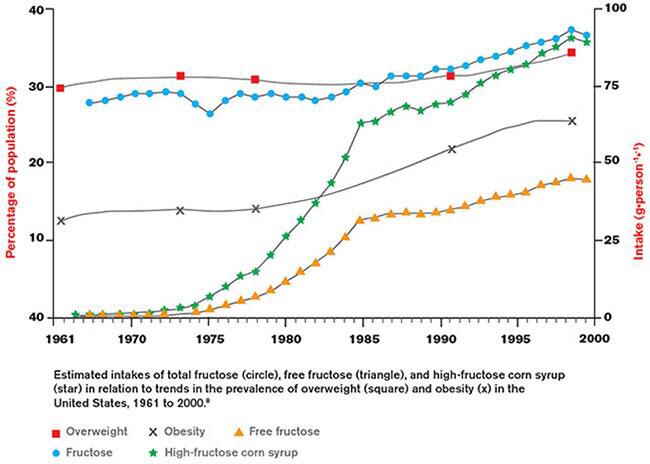
So, why are we all of a sudden eating so many grains, sugars, and polyunsaturated oils? And why are these foods making us increase our daily caloric intake by 600 calories over the last 40-50 years?
Is it because a lack of saturated fat is leaving us ravishingly hungry? Or because the addictive properties in wheat, fructose, and sugar are making us eat more than we need?
Is the over-reliance on high-carbohydrate foods creating a blood sugar rollercoaster that’s leaving us consistently hungry throughout the day?
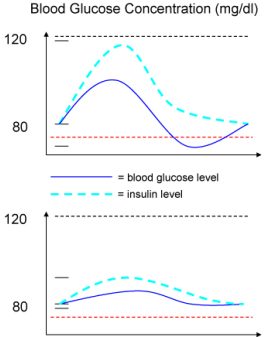
Or are the low-fat foods we’re choosing too high in sugar, fructose and artificial sweeteners?
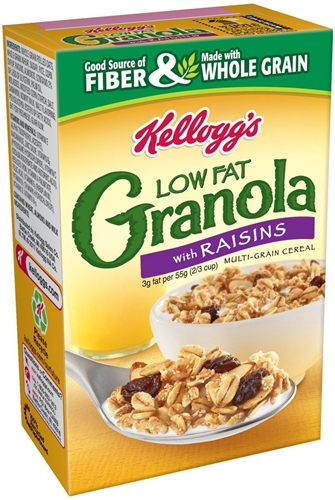
Does it matter?
Either way it needs to stop, and I think you’d agree that we’re better off fixing the problem, instead of arguing about how it started.
So What’s the Best Solution?
Similar to the research on heart disease, the only time saturated fats have been blamed for increasing body fat is when they’re added to a high-carbohydrate diet. Conversely, when carbohydrates are low-to-moderate, we can eat a fat and caloric excess and still lose.
According to the evidence, a low-fat diet only comes close to a low-carb one, when there’s a serious caloric deficit (1, 2, 3, 4, 5, 6, 7, 8). And in many cases, the low-carb diets reigns supreme for fat loss despite a daily excess of 300-500+ calories (1, 2, 3, 4, 5, 6, 7).
In a 2003 study from the Journal of Pediatrics, overweight adolescent boys were assigned to a low-fat or low-carb eating plan. The low carbohydrate group not only lost TWICE as much weight (19lbs vs. 8.5lbs) but they averaged 700 MORE calories per day!
Restricting carbs also trumps restricting fat for preventing heart disease and diabetes. Reducing all of the symptoms related to the metabolic syndrome (abdominal fat, high blood pressure, elevated fasting glucose, high triglycerides, low HDL cholesterol, insulin resistance) to a greater extent than any other dietary approach (1, 2, 3, 4, 5). For example:
-Samaha study from 2003 (Low Fat vs Low Carb):
- Triglycerides went down by 38 mg/dL in the LC group, compared to 7 mg/dL in the LF group
- Insulin sensitivity improved on LC, got slightly worse on LF
- Fasting blood glucose levels went down by 26 mg/dL in the LC group, only 5 mg/dL in the LF group
- Insulin levels went down by 27% in the LC group, but increased slightly in the LF group
-Aude study from 2004 (Low Fat vs Low Carb):
- Triglycerides went down by 42 mg/dL in the LC group, compared to 15.3 mg/dL in the LF group
- LDL particle size increased by 4.8 nm and percentage of small, dense LDL decreased by 6.1% in the LC group, while there was no significant difference in the LF group
-Volek study from 2009 (Low Fat vs Low Carb):
- Triglycerides went down by 107 mg/dL on LC, but 36 mg/dL on the LF diet
- HDL cholesterol increased by 4 mg/dL on LC, but went down by 1 mg/dL on LF
And all the while, reducing saturated fat seems to have no beneficial role for preventing cardiovascular disease or losing weight, other than what can be attributed to a caloric deficit.
(…while probably destroying your brain)

In other words, a low carbohydrate diet is the best approach for ‘most people.’ Because ‘most people’ have a horrible cardiometabolic profile, and ‘most people’ are obese. Plus, ‘most people’ turn to high-glycemic carbs to replace the void from fat, which ruins their heart health (1, 2), makes them obese, and give them diabetes (1, 2) and dementia.
Which isn’t to say people can’t lose weight on a low-fat diet, as people seem to be able to lose weight on any diet. But not every diet creates long-term results without sacrificing long-term health.

The reason low-fat diets fail is because lack of satiating fat leaves us hungry, and pushes us to high-sugar foods. Which, other than making us ‘store fat’ and ‘prone to disease’ (because of chronically elevated insulin), pushes us into round-the clock eating because of the the ups and downs in blood sugar. Ultimately forcing us to seek-out high-sugar grain-dominant foods (because it’s all we can eat), and making us crave more high-sugar grain dominant foods, because they’re addictive.
The other reason it fails is because the body requires fats for proper functioning, and only utilizes carbohydrates for energy. Which ironically enough, can be replaced with dietary fats and proteins, previously stored fat, and ketones. Since there’s actually, “no dietary requirement for carbohydrates” and there’s a library of proof that we can functional perfectly well (and more than likely BETTER) by eating less (or none)!
So Why Aren’t They Telling Everyone to Go Low-Carb?
Great question! I’d say this starts with a government that refuses to face the facts.
Why?
Money? Economics? Fear of Admitting Fault?
But also because there’s a long list of medical pro’s and scientists openly opposing it.
Why?
Too busy to read the research? Scared to lose their license? Pharmaceutical kickbacks?
Book sales?

Either way, I think the message is clear. We can argue til we’re blue in the face on whether or not the caloric excess is driving obesity, or whether the lack of satiating fat and over-reliance on carbohydrates is driving the caloric excess. But either way, the solution for the obesity and disease problem is the same:
CUT THE CARBS & FILL UP ON FAT!
It’s good for your heart, great for your brain, better for your blood sugar, and the best way to burn mounds of fat without going hungry (1, 2) and gaining it back.
Not surprisingly, it’s also the way they treated obesity and diabetes in the early 1900’s…before insulin, Kelloggs, and BigPharma came along.
Stay Lean!
Coach Mike
RELATED ARTICLES:
The UNDEReducated Authority on Nutrition
From Chronic Inflammation to Chronic Disease
Did a Low-Fat Diet Burn More Than a Low-Carb One?
